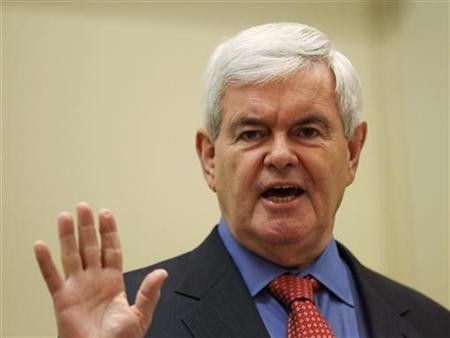Newt Gingrich’s Sharia Law Stance Raises Questions

If former House Speaker Newt Gingrich's past statements are to be believed, the primary threat facing the U.S. isn't a foreign adversary but the gradual imposition of Islamic Sharia law in America.
Gingrich likes to couch his policy positions in broader ideas, invoking his training as an historian to offer context and clarity. So it went in a 2010 speech to the American Enterprise Institute. He depicted a clash of civilizations and ideologies between western liberalism and radical Islam, which he likened to World War II in its importance and the Cold War in its duration.
Gingrich's View of Sharia's Status in U.S.
But Afghanistan, the current presidential frontrunner asserted at the time, is not the central front in this conflict. It is in the United States, where Gingrich contended Sharia principles were slowly and insidiously taking hold.
Stealth jihadis use political, cultural, societal, religious, intellectual tools; violent jihadis use violence, Gingrich said. But in fact they're both engaged in jihad and they're both seeking to impose the same end state, which is to replace Western civilization with a radical imposition of Sharia.
He went on to describe Sharia law as a mortal threat to the survival of freedom in the United States and to call for a federal law barring courts from using Sharia law. He reiterated the call for federal Sharia ban while speaking later that year at the Values Voter Summit, and told an audience at the Cornerstone Church in Texas that he feared his grandchildren would see America dominated by radical Islamists.
For evidence, Gingrich has pointed to cases that include a New Jersey judge invoking Sharia when he denied a Muslim woman a restraining order against her ex-husband (an appeals court reversed the decision) and a blind student at St. Cloud State University being exempted from a class after Muslim students objected to his seeing-eye dog on religious grounds. He drew plaudits from like-minded conservatives, with Andrew C. McCarthy writing in the National Review that Gingrich had crystallized the essence of our national security challenge by making the question of where do you stand on sharia? paramount.
I think what it means if he were elected president is that he would endorse efforts already underway to exclude Sharia as well as other non-American law codes from being applied in American courts, said Daniel Pipes, founder of the Middle East Forum, adding that Gingrich's American Enterprise Institute speech was groundbreaking.
Critics Argue Gingrich Is Exaggerating Highly Unlikely Sharia Threat
But critics charge that Gingrich is invoking a few isolated incidents to exaggerate a highly unlike threat. Some contend that he is fomenting suspicion of Muslims for political gain, drawing parallels to his vehement denunciations of Park51, the Muslim prayer space in downtown Manhattan that opponents quickly labeled the ground zero mosque.
His viewpoint is an extremist viewpoint that would lead to perpetual hostile interactions with the Muslim world, said Ibrahim Hooper, a spokesman for Council on American-Islamic Relations. It's truly frightening that a mainstream political candidate would hold such extremist conspiratorial views, and it would be even more frightening to see those views implemented in terms of foreign policy or domestic policy for that matter.
A report by the Center for American Progress entitled drew a similar conclusion, tracing the formation of a constellation of bloggers and pundits, Gingrich among them, who offered a vision of Islam as at war with the West. Faiz Shakir, vice president at Center for American Progress and one of the report's authors, said such sentiment seemed to have peaked and begun to recede after U.S. Rep. Peter King's, R-NY, controversial hearings on the radicalization of members of the American Muslims and Herman Cain's statement that Muslims serving in his cabinet would need to take a loyalty oath. While he characterized Gingrich's embrace of the movement against Sharia law as opportunistic, he said the former speaker has a long history of portraying Islam as a threat.
I would consider Newt Gingrich absolutely one of the leading amplifiers of anti-Muslim sentiment in the country, Shakir said. He's probably the leader of ideological thought in this base -- he's been doing this for a much longer period of time than, say, Michele Bachmann or Rick Santorum.
Experts also note that a general critique of Sharia law is an oversimplification given the lack of a single, monolithic version of Sharia law. The types of violent manifestations of Sharia that Gingrich warns about when he references principles and punishments totally abhorrent to the Western world, such as stoning people to death or requiring multiple witnesses of rape, reflect more radical versions of Sharia. Osama bin Laden or Al-Shabab's version of Sharia law is by no means the definitive one.
There's no book of Sharia law, Hooper said. You have different schools of thought, different streams, different interpretations; it's like any other faith.
Calls to excise Sharia principles from the American legal system also overlook the fact that Anglo-American jurisprudence has absorbed or derived numerous ideas from Sharia, said Raj Bhala, an associate dean for international comparative law at University Kansas School of Law who teaches a class on Islamic law.
It is intellectually incomplete and even disingenuous to talk only about insidious elements of the Sharia coming into American law when in fact there are many principles and doctrines from the sharia that we have seen now in our own legal system and which are essential ingredients in our legal system, Bhala said. Unfortunately, in the political climate sometimes the aberrational and the extreme get stressed at the expense of the common and the agreed upon, and that's I think what's happening here.
- -
© Copyright IBTimes 2024. All rights reserved.





















